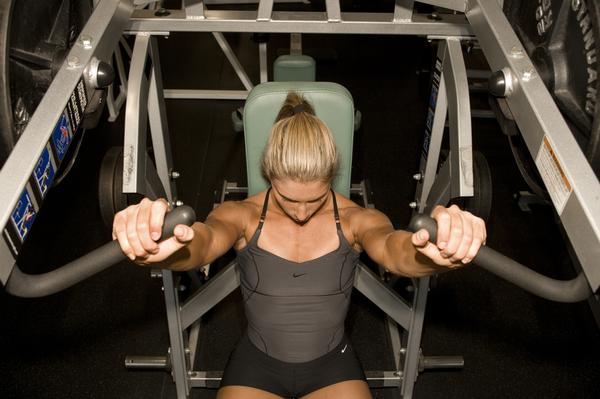Here at JillFit, and over on the Metabolic Effect blog, we tend to strictly profess the physiological effects of exercise, most importantly weight training. I doubt I need to convince you of the many benefits of weight training for the body. BUT, if you’ve forgotten, allow me to be annoyingly thorough :)
Quickie Reminder/Physical Benefits of Weight training:
- Builds muscle strength & size
- Boosts joint stability, reflexes and functionality
- Increases basal metabolic rate via added muscle mass (small, but can add up)
- Increases number of calories burned during exercise via added muscle mass
- Boosts your power and ability to sprint faster
- Improves skin and soft tissue integrity (including improvement of cellulite appearance in many)
- Boosts cognition and brain power
- Increases testosterone and growth hormone naturally (better sleep, sex drive, ability to burn fat, etc)
- And much more…
Not convinced yet? Well, how about the fact that lifting weights makes you feel like a superhero?? :)
Weight Training Has Psychological Benefit
Back in December, I asked on all my social media feeds how weight training made people feel. Here are the top responses of that fill-in-the-blank pseudo-survey, with over 100 responses:
“Weight training makes me feel … “
- Strong (13 responses)
- Confident (11)
- Alive (8)
- Empowered (8)
- Unstoppable (5)
- Sexy (4)
- LIke I can handle anything (4)
- Badass (3)
- Powerful (3)
- Happy (3)
- Like a superhero (2)
- And many more…
Do any of these resonate with you? They definitely do me. Especially confident, empowered and like I can handle anything. Physical strength (or even just the act of lifting) boosts our mental strength too.
Lifting weights consistently has a fairly predictable pathway to mental benefit and appreciation:
For many beginners, they begin a lifting regimen and within 2-3 weeks are convinced they look different. The reality is however, that though their strength may have increased very quickly during that time, they actually look fairly the same. But the mental change elicited as a result of lifting influences physical perception.
Then, after a month or two of consistency, you start to think, gee, I am not really seeing any changes. But, I know that I feel better when I lift regularly so I’ll keep at it, and you kind of stop looking for physical changes and allow yourself the pleasure of the mental boost.
Then, about 6-9 months into lifting regularly, all of a sudden you notice you look a whole lot different than you did when you started, and the physical changes become a lot more apparent. Whoa! **Happy dance**
The point is that the process of lifting weights–especially heavy weights–earns plenty of fabulous physical benefits, but what is often overlooked is the power of lifting heavy weights to boost self-confidence and self-efficacy. And I would argue, by extension, self-worth and willingness to try new things.
Physical strength begets mental strength
There’s an emotional satisfaction associated with the accomplishment of weight training that has a very different feel than that of running a marathon or completing a yoga retreat. Physical strength begets mental strength. There’s a sense of I-can-do-anything. There’s a sense of mental fortitude that comes about as a results of building physical fortitude. Basically, you become a badass.
And what else can I say, except, it’s fucking awesome :)
Lifting weights is transformative.
And if you have not given yourself a full year with heavy weight training, I encourage you to try it. It’s a physique-changer yes, but also has the power to open you up to try new things, gives you a feeling of accomplishment and boosts your confidence in clothes (and out of them!)
How do you get started? Here are a few quick tips:
If you are brand spankin’ new to weights: I would definitely hire a trainer for a couple sessions to help you get your form cues down and show you some simple exercises. You might begin with more machines and work your way up to free weights.
If you maybe got out of weight training for a bit, and want to get back into it: Start with a simple Upper Body/Lower Body Split routine. Start with 1 day of each per week, and work your way up to 2 days of each. Here is a great at-home split for you, as an example. At the gym, use free weights as much as possible. Start lighter and move slow & with control until you prime the neuromuscular pathways, which for newbies can take a few months. Then add weight slowly.
If you’re an advanced weight trainer: Consider advanced techniques, like power lifts, olympic lifts or structuring your week using doing body part splits (bodybuilding-style), like this:
- Monday – Chest/Triceps
- Tuesday – Legs
- Thursday – Back/Biceps
- Friday – Shoulders/Abs
- Saturday – Optional 2nd leg day
Go Heavy
People always ask what I mean by “heavy.” This is a relative term, right? And it will be different for everyone. Thus, I can’t tell you exactly what weight to lift. You will have to use a bit of trial and error to figure out which weight elicits a burn and by the end of the set is too heavy to lift. It should be challenging. But to give you an example, “heavy” for most women will be in the 15-25 lb dumbbell area for most upper body exercises.
Lifting heavy takes practice, patience and a certain level of self-trust that is built overtime. Stay safe, start slow and ramp it up as you start to feel physically (and mentally!) stronger.
Good luck! ox Jill
Related: Muscle Building for Women: The SCORCH Model

